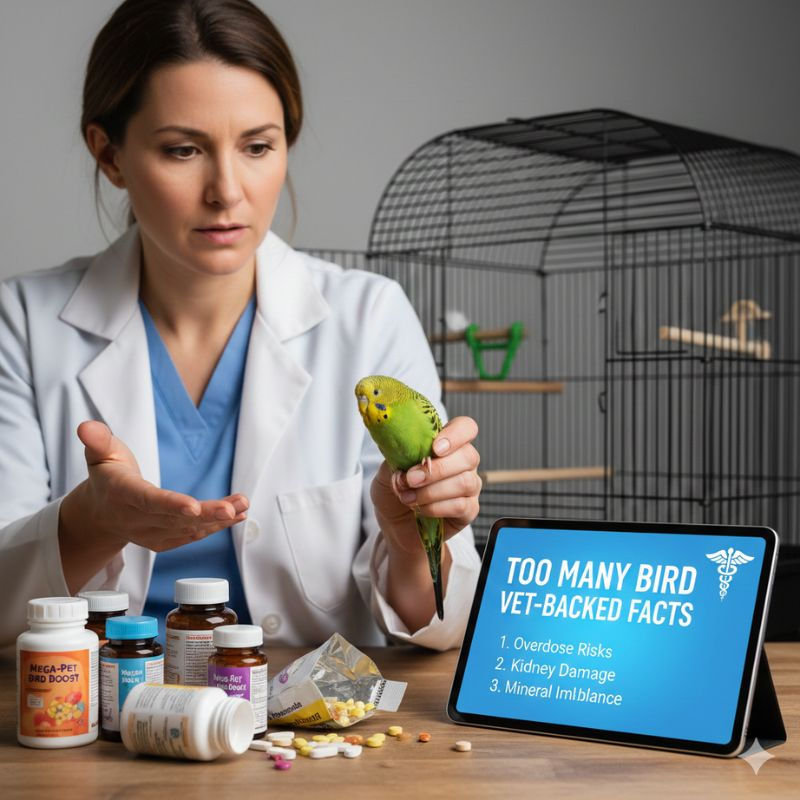How to Take Care of Birds: 7 Simple Steps Every Bird Owner Should Follow
- petperchlove
- May 15, 2025
- 3 min read

Birds are intelligent, social, and beautiful companions, but they require specific care to thrive in a home environment. Whether you’re a new bird parent or looking to refresh your knowledge, understanding how to take care of birds properly is essential for their health and happiness.
In this guide, we’ll walk you through 7 simple steps every bird owner should follow, ensuring your feathered friend enjoys a long, joyful life.
Step 1: Create a Safe and Comfortable Living Environment
The first step in how to take care of birds is setting up a secure, spacious cage. Birds need room to stretch their wings, climb, and play. Choose a cage that suits your bird’s size and add bird-friendly accessories like perches, swings, and toys.
Tips:
Ensure bar spacing is appropriate to prevent escapes or injuries.
Place the cage away from drafts, direct sunlight, and loud noises.
Provide a quiet space where birds feel safe to rest.
Step 2: Provide Clean, Fresh Water Daily
Hydration is vital for birds’ health. Always provide clean, fresh water in a spill-proof container. Wash water dishes daily to prevent bacterial growth.
Bonus Tip:
Consider using filtered water to avoid harmful chemicals found in tap water, which can be dangerous for sensitive birds.
Step 3: Offer a Balanced and Varied Diet
One of the most critical aspects of how to take care of birds is proper nutrition. A healthy bird diet includes a mix of pet bird food, fresh fruits, vegetables, seeds, and pellets.
Recommended Bird Food Components:
Pellets: A high-quality staple of most birds’ diets.
Fresh Fruits & Vegetables: Apples, carrots, leafy greens, and berries.
Seeds & Nuts: Offer sparingly as treats due to high-fat content.
Specialized Birds Food: Choose species-specific birds food for tailored nutrition.
Avoid:
Avocado, chocolate, caffeine, and salty or sugary foods, as they are toxic to birds.
Step 4: Ensure Mental Stimulation & Social Interaction
Birds are highly intelligent and need mental stimulation to stay happy. Bored birds can develop destructive behaviors like feather plucking.
Engagement Ideas:
Rotate toys regularly.
Teach simple tricks or commands.
Allow supervised out-of-cage time.
Spend quality time talking and interacting with your bird daily.
Step 5: Maintain Proper Hygiene
Cleanliness is key in how to take care of birds. Regular cleaning prevents diseases and ensures a pleasant environment for both birds and owners.
Hygiene Checklist:
Clean the cage tray and perches weekly.
Replace soiled bedding.
Disinfect food and water dishes daily.
Bathe your bird or provide a bird bath for self-cleaning.
Step 6: Schedule Regular Veterinary Checkups
Routine vet visits are crucial for early detection of health issues. Find an avian veterinarian who understands bird-specific health concerns.
Look for:
Changes in droppings.
Fluffed-up feathers for prolonged periods.
Loss of appetite or lethargy.
Overgrown beak or nails.
Step 7: Ensure Safe Flight Time & Exercise
Birds need regular exercise to stay fit and healthy. Allow safe, supervised flight time in a bird-proofed room.
Safety Precautions:
Cover mirrors and windows to prevent collisions.
Remove toxic plants and small objects that can be swallowed.
Keep other pets away during flight time.
Final Thoughts
Learning how to take care of birds isn’t just about basic feeding and cleaning; it’s about creating a loving, enriched environment where your bird feels safe, stimulated, and healthy. By following these 7 steps, you’ll ensure your bird enjoys a long, happy life as your cherished companion.
FAQs: How to Take Care of Birds
Q1: What is the best pet bird food for beginners?
For beginners, a balanced pellet-based pet bird food is recommended. Brands that cater to species-specific needs ensure your bird gets the right nutrients. Supplement this with fresh fruits and vegetables for variety.
Q2: How often should I feed my bird?
Most birds should be fed fresh food daily. Clean out uneaten birds food to prevent spoilage and bacterial growth. Treats like seeds or nuts should be given sparingly.
Q3: How can I tell if my bird is healthy?
A healthy bird is active, vocal, has bright eyes, smooth feathers, and a good appetite. Watch for changes in droppings, weight loss, or behavior, and consult an avian vet if you notice anything unusual.
Q4: Can I leave my bird alone all day?
Birds are social animals and can become lonely or stressed if left alone for long periods. Ensure they have toys for stimulation and consider getting them a companion bird if possible.
Q5: Is human food safe for birds?
Some human foods are safe, like apples (without seeds), carrots, and leafy greens. However, avoid feeding birds chocolate, avocado, onions, garlic, and salty or sugary snacks as these are toxic.



Comments